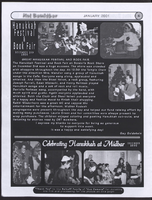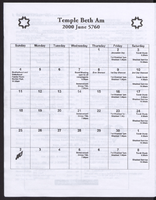Search the Special Collections and Archives Portal
Search Results
Audrey Wickman oral history interview
Identifier
Abstract
Oral history interview with Audrey Wickman conducted by Joanne L. Goodwin on June 24, 1996 for the Women's Research Institute of Nevada (WRIN) Las Vegas Women Oral History Project. Wickman opens her interview by discussing her upbringing in Kentucky, and her young adult life in Colorado. Wickman then talks about moving to Las Vegas, Nevada with her husband during the Depression to look for employment. She then describes the Mesquite Club in detail, including its members and the club's activities from the 1930s to 1950s. Audrey Swenson, Wickman's daughter, joins the interview at the end. She discusses what the Mesquite Club was like in the 1950s through 1970s, and being raised in Las Vegas as a child.
Archival Collection
Elgin Hamblin and Judith Hamblin oral history interview
Identifier
Abstract
Oral history interview with Eglin "Peggy" Hamblin conducted by Irene Rostine on October 25, 1991 for the Women's Research Institute of Nevada (WRIN) Las Vegas Women Oral History Project. Judith Hamblin, Eglin's daughter, helps prompt her mother to respond and recall answers. Hamblin opens her interview by discussing her time working for Basic Magnesium, Inc. during World War II. She describes her work, and her husband's duties at the plant as a security guard, and as a member of the construction crew that built the plant and the surrounding workers' homes. Hamblin goes on to discuss life in Henderson, Nevada at the time, and how the local high school was an integral meeting and event spot for the community.
Archival Collection
John Theodore Gilcrease oral history interviews
Identifier
Abstract
Oral history interviews with John Theodore Gilcrease conducted by Robert McCracken on October 09 and 10, 2000 and March 21, 2001 for the Women's Research Institute of Nevada (WRIN) on behalf of the Tule Springs Preservation Committee. Gilcrease opens his interview by discussing his family's lineage and Irish heritage. Gilcrease then explains how his family purchased farm land in the Tule Springs, Nevada area in 1920. He discusses how his family modified and changed the land, their irrigation system, and the animals they bred. Gilcrease goes on to talk about the development of the farm and how the development of Las Vegas, Nevada affected the property. Gilcrease recalls the life of his farm and family from the early the 1900s to the 1960s and talks about other prominent farming families in the area.
Archival Collection
Carol Corbett Papers
Identifier
Abstract
The Carol Corbett Papers, 1981-2006, contain papers from Nevada organizations, Clark County offices, and general biographical and geographical information. Included are Corbett Recorder Scholarship and Hoggard Memorial Scholarship data, files for the Clark County Recorder's Office, Clark County Credit Union, Records Management Policies and Procedures, a District Attorney Opinion Project, Nevada Women's History Project, Nevada History Archives, and the State Historical Records Advisory Board (SHRAB) files. There is also information on gay issues. Materials also include slides and photographs.
Archival Collection
Bruce Turner Collection on Transportation and Water in Southern Nevada
Identifier
Abstract
The Bruce Turner Collection on Transportation and Water in Southern Nevada contains reports, publications, legal files, project proposals, journal articles, financial reports, photographs, and maps concerning transportation policy and water usage in Southern Nevada from 1980 to 2014. The collection contains documents from organizations including the Regional Transportation Commissions of Clark County and Southern Nevada, the Clark County Department of Air Quality and Environmental Management, Clark County Comprehensive Planning, the Urban Land Institute, the City of Las Vegas Neighborhood Services Department, the Southern Nevada Water Authority, and the Las Vegas Valley Water District.
Archival Collection

Transcript of interview with Fred B. Houghton by Philip Partridge, February 9, 1975
Date
Archival Collection
Description
On February 9, 1975, Philip Partridge interviewed former attorney, Fred B. Houghton (born August 27th, 1894 in Chicago, Illinois) in his home in Las Vegas, Nevada. The two discuss how Houghton first moved to Las Vegas and how he came to practice law. The interview concludes with Houghton’s thoughts of Southern Nevada.
Text

Transcript of interview with Sigrid Capel by Michael McKenna, February 10, 1980
Date
Description
Text

Laura Gentry interview, February 26, 1977: transcript
Date
Archival Collection
Description
On February 26, 1977, collector Harold May interviewed Laura Gentry (born May 1897 in St. Thomas, Nevada) at her cabin in Gold Butte, Nevada. In this interview, Laura Gentry discusses living in St. Thomas and Overton, Nevada. She discusses the development of the Overton and Gold Butte areas of Nevada as well as the people involved in mining in these areas.
Text


